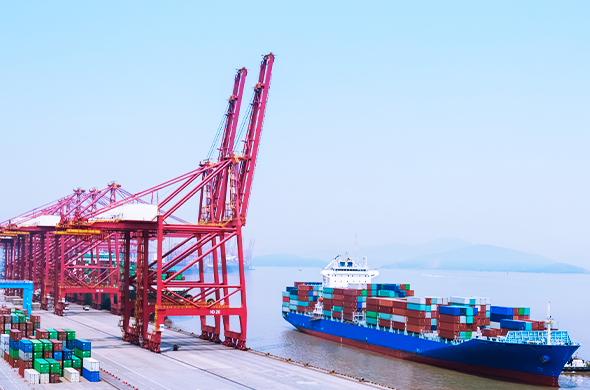To keep you better informed of the current operational situation occurring in the U.S., we would like to provide you with the following updates.
Operations in Miami, Port Everglades, and Jacksonville Terminals are expected to be affected by Tropical Storm Nicole, please expect delays.
Vessels continue to be pushed further off the proforma schedule causing blank sailings, and the continuous increase of import volume within the past two years has affected operations in almost all areas of the country, creating delays.
COVID-19 sequels, labor shortage, labor strikes at ports and rail companies, along with inclement weather still impact the global supply chain. Lead times remain extended.
With all the recently mentioned events, there is a high number of container vessels currently congested at different ports around the world, affecting logistics services overall.
Within the past few months, port congestion has increased on the East Coast Southeast and Gulf Coast ports, especially in Savannah and Houston, mainly due to an increase in imports from Asia. Container availability in the USA is tight in the areas of the South Atlantic Coast and Gulf Coast.
Limited trucking and equipment availability are among the main challenges across the supply chain.
Terminals Updates:
Due to increased volume and labor shortage, most terminals are experiencing congestion issues, including New York, Savannah, Houston, and Oakland.
Each month, high cargo volumes continue to enter the U.S., with most North American ports facing berthing congestion.
Some carriers are omitting ports and altering schedules for services into US East Coast due to high congestion and delays.
U.S. East Coast:
New York/New Jersey: Vessel waiting time is up to 2 days due to high import volume and severe port congestion. Yard utilization is about 70%. Import dwell time at the APM terminal is 4 days. Average of 11 container vessels at anchor.
Norfolk: Vessel waiting time is up to 4 days due to port congestion.
Savannah: Vessel waiting time is between 7 -15 days due to high import volume and port congestion. The terminal capacity is at 70% utilization. Dwell time for import is, on average 10 days. Last week, 31 container vessels were waiting offshore.
Miami/Port Everglades: Vessel waiting time is up to 4 days due to high import volume. Overseas port congestion is affecting service from Port Everglades to East Coast South America, which has subsequently resulted in delays in operations and vessels being removed from schedules.
U.S. West Coast:
Long Beach: Vessel waiting time is up to 2 days due to high import dwell volume.
Oakland: Vessel waiting time is up to 18 days due to high import volume, yard congestion and labor shortages. Ships looking to berth in Oakland will now wait offshore, which will delay operations. The backlog is caused mainly due to a massive number of empty containers in terminals waiting to be returned to Asia. Terminals within the port are heavily congested. Containers stacked high are the result of lack of availability for timely pick-ups. There were 13 container vessels waiting offshore in the previous week.
U.S. Gulf Coast:
Houston: Vessel waiting time is up to 15 days due to high import volume, labor shortage, and port congestion. There were 11 container vessels in queue last week.
Rail Terminal Updates:
Increased terminal dwell due to surge of import volume and labor shortage is the main challenges affecting rail services. Congestion at rail facilities is a major issue especially in Chicago and Los Angeles areas.
BNSF & UP/LAX/LGB: Limited gate capacity, restrictions, rail car shortages, and limited reservations continue, causing increased delays on import rail units. There is limited allocation currently.
Chicago Rail Ramp: The rail facilities in Chicago are experiencing congestion due to dwelling containers and chassis shortages. There are gate restrictions and lane suspensions, causing extended delays in pick-ups and deliveries. The rails continue to monitor in-gates with allocation or reservations.
Due to capacity restrictions, certain rail operators utilize offsite depots to store inbound containers. This leads to further delays in getting containers moved to the new location, and upon arrival some containers are put in stacks which makes them inaccessible for pick up.
CSX Bedford Park: Limiting reservations for in-gate to rail.
NY/NJ: Chassis shortage includes rail ramps due to the high increase in import volume.
Philadelphia: Severe chassis shortages in the Philadelphia area. Extended delays in pick-ups, deliveries, and drayage.
Charleston: Lack of chassis causing extended delays in pick-ups, deliveries, and drayage over to rail facilities.
Savannah: Continued congestion and delays at the local ramps. Shortage of chassis and equipment continues to affect operations.
Jacksonville and Miami: The shortage of equipment in Florida has carriers struggling to keep the service due to a slower turnover of import containers coming into the area. Most loads have been delayed an average of one to two weeks. Equipment shortages are resulting in pick-up delays.
Seattle: Congestion due to increased dwell for Import rail cargo.
Houston/Dallas: There is a severe chassis shortage and ongoing congestion in the area. Finding truckers has become a challenge as they are booked for 2-3 weeks in advance.
Chassis issues are challenging in all regions in the U.S. This is due to the division of the intermodal system and the lack of additional capacity at different levels of the supply chain.
Equipment Availability:
Shortage of container equipment for Hazardous cargo in Houston is an additional issue that affects operations in the Gulf Coast, especially for freight moving to Los Angeles.
For intermodal freight, limited capacity in certain areas of the country due to high import volume and drivers’ shortage.
There are continuous chassis shortages in Los Angeles/Long Beach, New York, Philadelphia, St. Louis, Columbus, Cleveland, Chicago, Memphis, Atlanta, Nashville, and Louisville.
Equipment availability remains an issue at Atlanta, Chicago, Cincinnati, Columbus, Detroit, Kansas City, Minneapolis, Memphis, Nashville, Omaha, St. Louis, South Florida, and Seattle.
Trucking capacity is reduced in most areas in the USA, resulting in additional delays for picking and delivering cargo.
Source: Shipco Transport

